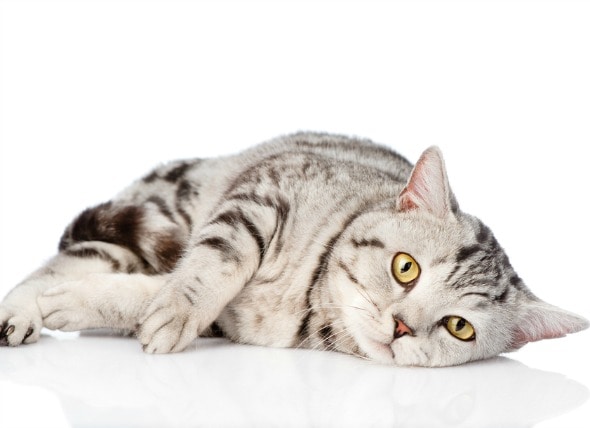
Vomiting is characterized by the contents of the stomach being ejected. Chronic vomiting, meanwhile, is marked by the long duration or frequent recurrence of said vomiting. Diseases of the stomach and upper intestinal tract are the primary cause for this type of vomiting. Secondary implications are diseases of other organs, which bring about an accumulation of toxic substances in the blood, stimulating the vomiting center in the cat's brain.
Severe complications can occur when a cat is not getting the nutrients it needs, or when food is inhaled into the airways, which can lead to coughing, and even pneumonia.
Chronic vomiting can affect both dogs and cats. If you would like to learn more about how this condition affects dogs please visit this page in the petMD pet health library.
SYMPTOMS
Symptoms of vomiting include heaving, retching, and the expulsion of partially digested food. The contents being expelled by the cat may be in predigested form, tubular in shape, and often covered with a slimy mucus or bile.
A symptom that may be indicative of a more serious condition is blood in the vomit, which can signal an ulcer or cancer.
CAUSES
The biggest problem with determining the cause of vomiting, and devising a treatment plan, is that there are so many possibilities. Some of the possible causes for chronic vomiting include:
- Ulcer
- Cancer
- Gastritis
- Liver failure
- Kidney failure
- Pancreatitis
- Pancreatic tumors
- Inner ear diseases
- Addison’s disease
- Heartworm disease
- Elevated thyroid function
- Ingestion of foreign object
- Bladder obstruction or rupture
- Feline panleukopenia virus
- Ketoacidosis (a form of diabetes)
- Uterine infection (more common as the cat reaches middle age)
DIAGNOSIS
There are so many possibilities for this condition that determining a cause for chronic vomiting may take some time. You will need to cooperate with your veterinarian in trying to pinpoint if there is anything related to your cat’s background or habits that might account for it.
Your veterinarian will begin by determining whether your cat is actually vomiting or just regurgitating (i.e., whether it is based in the stomach, or not). You will want to pay close attention to the pattern of your cat's vomiting so you can give a thorough description of the symptoms, as well as how soon after eating the vomiting occurs. Your veterinarian will ask you to describe the appearance of the vomit, and what your cat looks like when it vomits.
If your cat is retching, and heaving from the belly, it is probably vomiting. The food that is in the vomit will be partially digested and somewhat liquid. A yellow fluid called bile will normally be present along with the expelled stomach contents.
If the cat is regurgitating, it will lower its head and the food will be expelled without a lot of effort. The food will be undigested and probably will be tubular in shape, more often solid and covered with slimy mucus than not.
Your cat may try to re-eat the regurgitated food. It is a good idea to keep a sample of the expelled content, so that when you take your cat to see the veterinarian, an examination can be made to determine whether the material is vomit or regurgitation, and what might be present in the contents.
Your veterinarian will need to know about your cat’s activities, habits, and surrounding environment, as well as what medicines your pet may be taking. Factors that are significant and must be followed-up on immediately are instances when the vomit has granule-like granules in it (may appear like coffee grounds). These granules are indicative of blood being present in the vomit. Fresh blood in the vomit will often indicate stomach ulcers or cancer.
If your cat has a fever, a stomachache, jaundice, anemia, or masses in the stomach, your veterinarian will be able to make a more specific diagnosis.
Sometimes, something as simple as coughing will cause a cat to vomit. If this appears to be the case, the cause of the coughing will need to be investigated. Your doctor will look into your cat's mouth to see if a foreign object has become caught in the esophageal opening (back of the mouth), or, if indicated, X-rays may be used to determine if there is an object deeper in the esophagus, or in the stomach.











0 comments:
Post a Comment